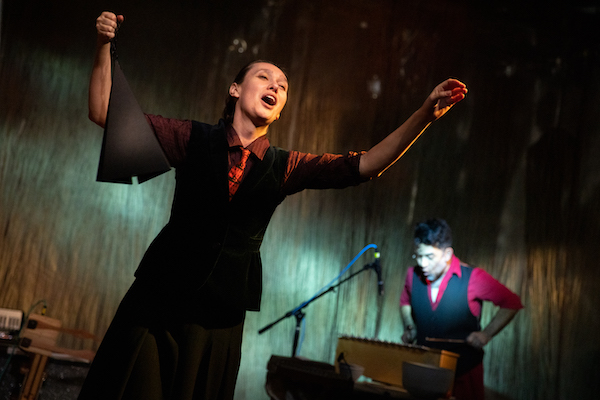“mɔɹnɪŋ [morning//mourning]” launches Prototype Festival with remarkable cosmic journey

Opera in the 21st century is what’s called a growth industry. New works continue to accumulate, and the public attention — and occasional successes — of these has been great enough to even steer the mighty ship of the Metropolitan Opera in new directions.
For the last decade, the Prototype Festival has moved this initiative along as well, showcasing new music dramas. That newness has often been just the state of the ink on the page, not necessarily new means to tell stories that follow 19th century models. There is still enormous room to experiment with structure and form, to catch up with now old innovations in theater and film.
Gelsey Bell’s mɔɹnɪŋ [morning//mourning] was a step into that open space, and a remarkable one. The work was presented in its world premiere Friday night at HERE Arts Center.
Prototype calls this work “music theater,” a fair category for a piece that has a dramatic narrative but no characters. The story of mɔɹnɪŋ [morning//mourning] is that of the Earth, from the 21st century into the nearly unimaginably far future. The narrative starts with all humans having vanished and imagines what might happen to the planet through the 30 years that follow, then the next hundred, the next 5,000, 50,000, one million, and beyond.
In short, this is a work of speculative history on a geologic and even cosmic scale, delivered as a series of wordless vocals and song, sung by composer Bell and four other vocalists (Ashley Pérez Flanagan, Justin Hicks, Aviva Jaye, and Paul Pinto).
Bell’s narrative is both plain and rich, like the simplest band of the most refined gold. She imagines the octopus evolving into an amphibious creature that communicates through color and eventually, after many millions of years, reaches space, colonizes Mars, and eventually overtakes and retrieves the Voyager spacecraft and their Golden Records. Those are the “Rosetta Stones” through which they see human civilization, after knowing us only through the remains of Mt. Rushmore.
The octopi befriend alien civilizations, and the Earth becomes a tourist destination due to our unique solar eclipses, where the moon’s size perfectly obscures the sun. That lonely image — also realized strikingly through the lighting — evokes a series of future milestones: at 241,000 years, when radioactive waste is finished decaying; at 650 million years, the date of the last fully solar eclipse as the moon gradually pulls away from the Earth; and the projected end of all life on the planet in 1.6 billion years.
Bell, along with Pinto, is part of Varispeed, the ensemble that has been turning Robert Ashley’s great avant-garde operas into repertory works, and mɔɹnɪŋ [morning//mourning] is an extended part of that uncanny, liminal style where speech tends toward song, and the musical score is concentrated on timbre and atmosphere. Prose is also essential to this idiom, and Bell wrote the libretto, which follows Ashley’s manner of using vernacular vocabulary and syntax to open up deep concepts and emotions.
Bell has put much more song into this piece than Ashley does, very much in the style of folk music—the songs tell stories about the world, including how animals might change after people are gone, the physical entropy of the remains of civilization, even the inevitable meltdowns of nuclear power plants. This is storytelling in the ancient manner of narrative poetry but with a modern sensibility.
Some of this is a cappella, like the gorgeous, wordless lament that began the performance, and at other times, the singers accompanied themselves and each other on a variety of instruments, including an accordion, metallophone, glass bowls filled with water and marbles, and a modular synthesizer. Much of the story also comes via spoken word, all done with more than a touch of intonation.
The experience was frequently magical, with amazing concepts delivered with charm — there was a marvelous song about Bristlecone pines and other trees — and, underneath uncanny depths of imagination, the contemplation of incredible distances of time and space, and a gently unbalancing sensation of possibility where one might normally expect foreboding. Charm seemed the fundamental key to this, with Bell pitching everything at a friendly, conversational level, and all the singers performing with tremendous warmth and charisma.
The overall mood is captured in another excellent folk song, with the refrain “Nothing lasts forever.” That this message produced feelings of joy and optimism is testament to how Bell has thought this through this extraordinary idea. Even the most astonishing turn works within the logic she built. And the spirit of the music, with touches of Meredith Monk and shape note singing, is full of engrossing, communal feeling.
There were some less successful elements that suffer from a flaw found in so much contemporary music that seeks to make its own mold. There is an instrumental interlude, heavily improvisatory and with the singers live-patching the modular synthesizer; it would be interesting in another context but didn’t belong here. And there is an extended vocal epilogue which is memorable in and of itself but which also comes after a strong natural ending. Both evidence where the piece doesn’t seem to hear its own strengths, and looks for support in standard ideas, when the truth of mɔɹnɪŋ [morning//mourning] is that it is like nothing else one has ever seen.
mɔɹnɪŋ [morning//mourning] continues through January 14. The Prototype Festival runs through January 15. prototypefestival.org